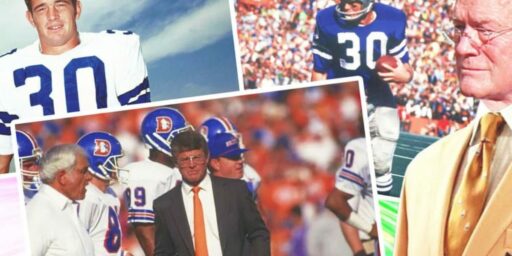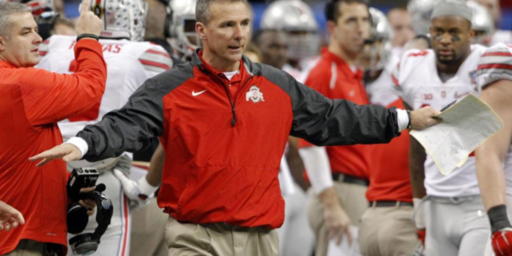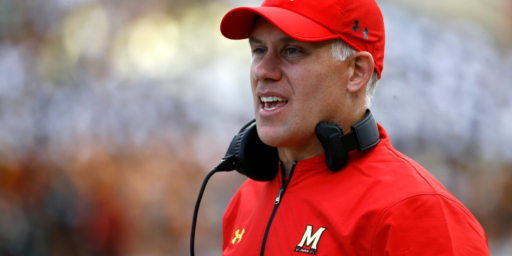NFL’s Rooney Rule
ESPN’s Michael Smith congratulates former Oakland Raiders head coach Art Shell for agreeng to interview for the Miami Dolphins vacancy, even though it is almost assured that LSU coach Nick Saban will get the job.
The Shell interview didn’t sit well with some, particularly the Pollard Alliance, the group that advocates minority hiring in the NFL. To them, and critics of the “search” process agree, the sit-down with Shell was a sham and a mockery. Call it a “shamockery.” They believe Shell is nothing but a token interview for a franchise that already has a new coach in place but does not want to incur a hefty fine (though the public relations hit, believe it or not, probably would be softer) by violating the “Rooney Rule,” the league’s policy, named after Steelers chairman Dan Rooney, requiring teams to interview at least one minority for its head coaching vacancy. And this is supposed to be a bad thing? The system certainly isn’t perfect, but it’s better than it was.
Shell made a wise choice by dismissing the Pollard Alliance’s reported efforts at discouraging him from partaking in the charade, much the way black coaches boycotted the Lions’ coaching search in 2003 when it was clear that Steve Mariucci was Matt Millen’s man, resulting in a $200,000 fine for Millen. “I can’t be concerned with what they’re doing with Nick Saban,” Shell, 58, said last week. “If you have an opportunity to get in front of a team and tell them about yourself, you need to do it.”
University of Miami defensive coordinator Randy Shannon, who also is black, on the other hand rejected the chance to interview before it was offered, saying, “Do you think they’re going to hire me? Let’s be honest. Why should I waste my time?”
Smith correctly argues that the only way to overcome the inertia that favors white coaches is for minority candidates to get their names out there by meeting with those doing the hiring–team owners.
That used to be the problem when it came to hiring head coaches, owners not knowing or wanting to know enough about black coaches to give them the chance to head their teams. White owners would rely on each other or media or their own assistants for prospects. Thanks to the “Rooney Rule” and the league’s minority internship program, darker faces now populate the sidelines and coaching boxes. Today there are six black head coaches, including Cleveland interim boss Terry Robiskie. The number isn’t what it probably should be, but it’s better than 20 years ago, when there were none.
As Smith correctly notes, team owners are ultimately going to hire the coach that they feel comfortable with. Forcing them to interview other coaches may well be cosmetic. But exposure, not necessarily hiring in any specific instance, is the rationale behind the Rooney Rule. To allow a consortium of minority coaches to turn the process on its head by refusing to interview for jobs where the owner is perceived to already have a guy in mind is silly.
I’m honestly surprised that Shell hasn’t fared better in getting a second shot, given his strong performance with the Raiders. But we’re clearly making an enormous amount of progress. For one thing, I never realized Robiskie–who has been an interim head coach for both the Redskins and the Browns–was black. When we get to the point where a coach’s race is no longer noteworthy, we’ll have arrived.






What’s sad to me is that groups such as the Pollard Alliance are having the opposite effect of what they supposedly are seeking. Instead of embracing the idea that the best candidate (white, black or otherwise) should land a given job, the Rooney rule has essentially forced GMs and owners, under threat of financial repercussions, to bring in a “token” candidate. The situation is similar in college football, where the Black Coaches Association called on black assistant coaches to turn down jobs at South Carolina due to that school’s quick hiring of Steve Spurrier, who was by all accounts a perfect fit and most likely the top candidate available for any college job.
Conversely, when Tyrone Willingham was hired at the University of Washington, there was no outrage that an experienced NFL coach, Mike Tice, had been passed over. Similarly, most everyone (myself included) thought Arizona and Chicago’s hirings of Dennis Green and Lovie Smith, respectively, were well-deserved. There was no public outcry for jilted white candidates because, quite frankly, there were none.
It’s hard not to look at scenarios like that and think that the Pollard Alliance and BCA are interested not in justice and equality, but simply adding another notch in the wall, regardless of qualifications.